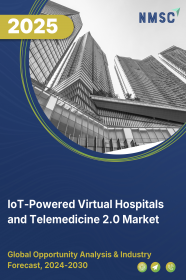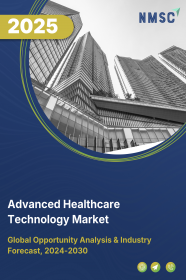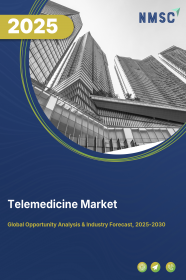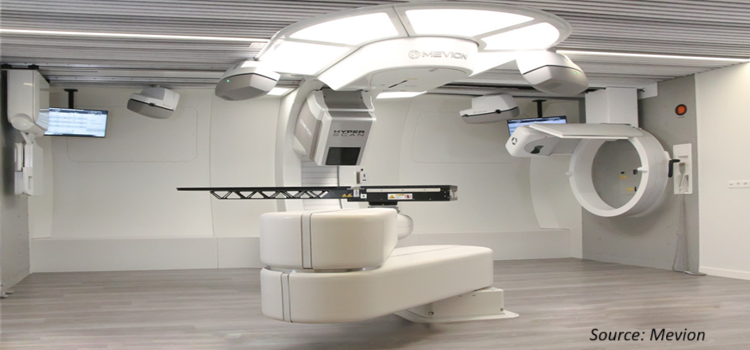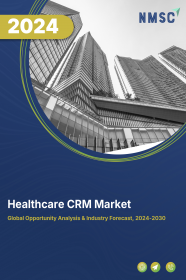
Healthcare CRM Market by Component (Software and Services), by Deployment Model (On-Premise Model and Cloud-Based Model), by Application (Customer Service and Support, Sales and Marketing, Community Outreach, Patient Information Management, and Others), and by End User (Hospitals and Clinics, Pharmaceutical Companies, Healthcare Payers, and Others) – Global Opportunity Analysis and Industry Forecast, 2024– 2030
US Tariff Impact on Healthcare CRM Market
Trump Tariffs Are Reshaping Global Business
Healthcare CRM Market Overview
The global Healthcare CRM Market size was valued at USD 16.38 billion in 2023 and is predicted to reach USD 34.62 billion by 2030 with a CAGR of 11.3% from 2024-2030.
The healthcare customer relationship management (CRM) market focuses on solutions that streamline interactions between healthcare provider and patients, enhancing relationships, service delivery, and operational efficiency.
Healthcare organizations utilize CRM tools to manage patient information, track interactions, and personalize care. The optimization of communication, improvement in patient engagement, and ensuring compliance with industry regulations through CRM systems enhance decision-making and workflow efficiency. This fosters stronger patient-provider relationships and helps organizations deliver better healthcare services, accelerating growth of the market.
Market Dynamics and Trends
The expansion of healthcare sector fuels the growth of the market due to the increasing need for efficient patient management solutions. This necessitates the implementation of advanced CRM systems to handle the increased volume of patient data and interactions. In 2024 the World Bank, announced an initiative aimed at extending health services to 1.5 billion people by 2030. This effort focuses on delivering affordable, high-quality healthcare across all stages of life, from infancy through adulthood. This initiative increases the demand for advanced healthcare solutions that enhance patient relationship management, streamline administrative processes, and improve communication, leading to better patient outcomes.
Moreover, the rising demand for telemedicine services drives manufacturers to develop advanced telemedicine products that in turn fuels the growth of the market. These products require advanced CRM systems to manage virtual patient interactions, streamline remote consultations, and integrate telehealth platforms.
For instance, in July 2023, Faye launched a new telemedicine product in partnership with Air Doctor. This innovative platform enables users to connect with healthcare professionals via video consultations, making it easier for individuals to access medical advice and treatment remotely. This launch increases demand for advanced patient management systems by promoting solutions that support more efficient virtual care delivery enabling healthcare providers to enhance patient engagement and improve overall care coordination.
Additionally, the rising digitalization in healthcare industry such as the adoption of artificial intelligence (AI), electronic health records (EHRs), telehealth platforms, and mobile health applications is driving the growth of the market. According to a report by the McKinsey & Company published in June 2024, the use of AI is expected to save USD 200 billion to USD 360 billion in healthcare spending. This projected savings of AI adoption drives the growth of the healthcare CRM market by increasing demand for advanced digital solutions in patient management.
However, the data privacy and security concerns associated with healthcare CRM solutions significantly restrains the growth of the market. These solutions manage sensitive patient information such as medical histories and personal data that leads to increased data privacy concerns. This focus on safeguarding data compels healthcare providers to navigate stringent regulations and standards, thereby hindering the growth of the market.
On the contrary, the integration of blockchain in healthcare CRM solution is expected to create ample growth opportunities for the market in the future. This technology ensures secure and immutable patient records, facilitates seamless data sharing among healthcare providers, and reduces the risk of fraud and data breaches. As a result, healthcare organizations improve patient trust, streamline operations, and comply with regulatory standards more effectively.
Market Segmentations and Scope of the Study
The healthcare CRM market report is segmented on the basis of component, development model, application, end user, and region. On the basis of component, the market is segmented into software and services. On the basis of development model, the market is classified into on-premise model and cloud-based model. On the basis of application, the market is divided into customer service and support, sales and marketing, community outreach, patient information management, and others. On the basis of end user, the market is classified into hospitals and clinics, pharmaceutical companies, healthcare payers, and others. The regional breakdown includes regions such as North America, Europe, Asia-Pacific, and the Rest of the World (RoW).
Geographical Analysis
North America dominates the healthcare CRM market share and is expected to continue its dominance during the forecast period. This is due to the implementation of government regulations mandating enhanced data security, patient management, and compliance with healthcare standards that drive the adoption of CRM solutions to streamline patient interactions and improve care coordination.
For instance, the U.S. Department of Health and Human Service regulates the HIPAA Privacy Rule that sets standards to protect individuals' medical records and other identifiable health information for health plans, and providers conducting electronic healthcare transactions. This regulatory framework promotes the adoption of patient engagement CRM solutions that enhance the overall quality of patient care and operational efficiency in the healthcare sector.
Moreover, the rapid increase in healthcare expenditure in the region drives the adoption of advanced CRM solutions among hospitals, clinics, and healthcare providers. This investment supports an increased focus on personalized patient care that leads organizations to tailor their services to individual needs.
According to the latest report published by the World Bank Group, the region's healthcare expenditure per capita accounted for USD 11,818 in 2022 compared to USD 10,088 in 2019, marking a growth of 17.1% in a period of 3 years. This surge in healthcare spending enhances patient engagement, streamlines communication between providers and patients, and improves data management that accelerates the healthcare CRM market growth.
Asia-Pacific is considered the fastest-growing region in the healthcare CRM industry. This is due to the rapidly growing pharmaceutical industry in the region that drives the healthcare CRM market demand for efficient customer relationship management solutions to enhance patient engagement, streamline communication between healthcare providers, and improve the overall healthcare experience.
The increasing focus on personalized medicine and digital health initiatives in countries such as China, India, and Japan further accelerate the adoption of healthcare CRM systems. According to the latest report published by the Invest India, the pharmaceutical industry in India is expected to reach USD 65 billion by the end of 2024 and USD 130 billion by 2030. The region's robust pharmaceutical manufacturing sector necessitates the need for better management of patient data and interactions that ultimately contributes to the market's expansion.
Also, the presence of key market players, including Exeevo and Sanofi China, further fuels the growth of the healthcare CRM market in the region as these companies drive innovation and competition. These companies contribute to the market by implementing CRM strategies including collaboration to improve customer engagement and operational efficiency.
For instance, in March 2023, Sanofi China collaborated with Exeevo and launched unified omnichannel OneCRM customer relationship management (CRM) platform that aims to enhance customer service and to provide Unified Digital Ecosystem. Their investments and advancements in healthcare CRM technology support the region’s growing demand for advanced systems that streamline patient interactions, enhance data management, and improve healthcare delivery that ultimately boosts the market growth.
Competitive Landscape
The healthcare CRM industry comprises of various key market players such as Trella Health LLC., AiCure, Butterfly Network, Inc, Atomwise, Inc., Salesforce, inc., IBM (Watson Health), Insilico Medicine, Inc., Sophia Genetics, Sense.ly, Zebra Medical Vision Ltd and others. These companies continue to adopt various market development strategies including product launches to maintain their dominance in the market.
For instance, in June 2024, Trella Health LLC. launched an innovations CRM platform designed to enhance the sales representative experience in the post-acute care sector. These advancements streamline workflows, enhance goal-tracking, and reduce administrative tasks, boosting productivity and referral relationships.
Moreover, in March 2024, Salesforce, inc. launched of Einstein Copilot introduces advanced AI-driven tools that automate and personalize patient interactions. This innovation enhances efficiency in healthcare settings, offering CRM solutions that improve patient engagement, streamline operations, and provide valuable data insights.
Key Benefits
-
The report provides quantitative analysis and estimations of the healthcare CRM industry from 2024 to 2030, which assists in identifying the prevailing market opportunities.
-
The study comprises a deep-dive analysis of the current and future healthcare CRM market trends to depict prevalent investment pockets in the industry.
-
Information related to key drivers, restraints, and opportunities and their impact on the healthcare CRM market is provided in the report.
-
Competitive analysis of the players, along with their market share is provided in the report.
-
SWOT analysis and Porters Five Forces model is elaborated in the study.
-
Value chain analysis in the market study provides a clear picture of roles of stakeholders.
Healthcare CRM Market Key Segments
By Component
-
Software
-
Services
By Deployment Model
-
On-Premise Model
-
Cloud-Based Model
By Application
-
Customer Service and Support
-
Sales and Marketing
-
Community Outreach
-
Patient Information Management
-
Others
By End User
-
Hospitals and Clinics
-
Pharmaceutical Companies
-
Healthcare Payers
-
Others
By Region
-
North America
-
The U.S.
-
Canada
-
Mexico
-
-
Europe
-
The UK
-
Germany
-
France
-
Italy
-
Spain
-
Denmark
-
Netherlands
-
Finland
-
Sweden
-
Norway
-
Russia
-
Rest of Europe
-
-
Asia-Pacific
-
China
-
Japan
-
India
-
South Korea
-
Australia
-
Indonesia
-
Singapore
-
Taiwan
-
Thailand
-
Rest of Asia-Pacific
-
-
RoW
-
Latin America
-
Middle East
-
Africa
-
Key Players
-
Trella Health LLC.
-
AiCure
-
Butterfly Network, Inc
-
Atomwise, Inc.
-
Salesforce, inc.
-
IBM (Watson Health)
-
Insilico Medicine, Inc.
-
Sophia Genetics
-
Sense.ly
-
Zebra Medical Vision Ltd.
REPORT SCOPE AND SEGMENTATION:
|
Parameters |
Details |
|
Market Size in 2023 |
USD 16.38 Billion |
|
Revenue Forecast in 2030 |
USD 34.62 Billion |
|
Growth Rate |
CAGR of 11.3% from 2024 to 2030 |
|
Analysis Period |
2023–2030 |
|
Base Year Considered |
2023 |
|
Forecast Period |
2024–2030 |
|
Market Size Estimation |
Billion (USD) |
|
Growth Factors |
|
|
Countries Covered |
28 |
|
Companies Profiled |
10 |
|
Market Share |
Available for 10 companies |
|
Customization Scope |
Free customization (equivalent up to 80 working hours of analysts) after purchase. Addition or alteration to country, regional, and segment scope. |
|
Pricing and Purchase Options |
Avail customized purchase options to meet your exact research needs. |

















 Speak to Our Analyst
Speak to Our Analyst



